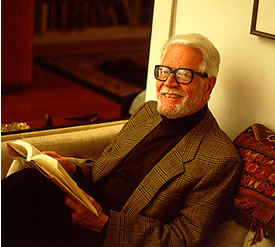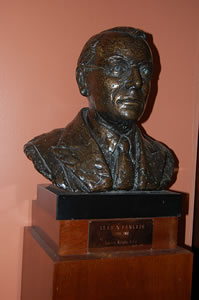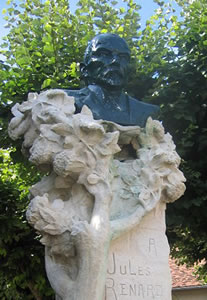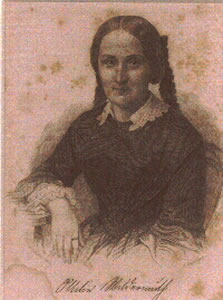De Nederlandse schrijver Arnon Grunberg werd geboren in Amsterdam op 22 februari 1971. Zie ook mijn blog van 22 februari 2007 en ook mijn blog van 22 februari 2008 en ook mijn blog van 22 februari 2009.
Uit: Tirza
„De gasten druppelen later binnen dan Hofmeester verwachtte. Het is half acht en er is nog niemand. Daarom eet hij de eerste portie gebakken sardines zelf maar op. Eigenlijk had hij pas later op de avond willen beginnen met het bakken van de sardines, maar hij had zich niet in kunnen houden. Drie sardines heeft hij al op. Hij eet de graat mee. Je merkt er weinig van, het zijn zulke kleine visjes.
Hij loopt naar Tirza’s kamer om haar een versgebakken sardientje aan te bieden. Ze heeft een zwarte jurk aan die al jaren in haar kast hangt, niet de jurk die hij samen met haar voor dit feest heeft aangeschaft. Een van driehonderd euro met bijpassende schoenen van bijna hetzelfde bedrag.
Hij moet teleurgesteld hebben gekeken, want ze slaat een arm om hem heen en zegt: ‘Ik doe hem nog weleens aan, pap, maar vanavond staat hij me niet.Vanavond gaat echt niet. Ik ben er niet voor in de stemming. Het is gewoon niet de jurk die bij deze avond hoort.’
Hij glimlacht grootmoedig met het bord sardientjes in zijn hand. ‘Maar we hebben hem voor deze avond gekocht, Tirza, speciaal voor jouw feest,’ zou hij willen zeggen. Hij zwijgt. Zijn teleurstellingen zijn zijn zaak. Ze moeten onzichtbaar blijven voor de wereld. Als Tirza zich omdraait, glimlacht haar vader nog steeds, schijnbaar onaangedaan. ‘Jou staat alles,’ zegt hij en laat haar alleen.
Hofmeester opent de badkamerdeur. Ibi is in bad gaan liggen met de Elle, het soort damestijdschrift dat ze vroeger verachtte.
‘Papa,’ roept ze, ‘kun je niet kloppen?’
Hij laat zijn blik gedachteloos over haar lichaam glijden, een paar seconden staart hij naar haar buik.‘Sorry,’ zegt hij,‘ben je zwanger?’
‘Papa,’ roept ze, ‘stel niet dat soort rare vragen en laat me alleen.’
Hij sluit de badkamerdeur en gaat zijn slaapkamer binnen. De echtgenote weet nog altijd niet wat ze zal aantrekken. Om de moeilijke beslissing uit te stellen – misschien schiet haar plotseling iets te binnen – föhnt ze eerst haar haren.Vrijwel naakt zit ze voor de spiegel in de slaapkamer, de föhn losjes in haar handen. Een nasmeulende peuk in een asbak.Kennelijk heeft ze de asbakken ergens gevonden.“

Arnon Grunberg (Amsterdam, 22 februari 1971)
De Vlaamse dichter en schrijver Paul van Ostaijen werd geboren in Antwerpen op 22 februari 1896. Zie ook mijn blog van 22 februari 2007 en ook mijn blog van 22 februari 2008 en ook mijn blog van 22 februari 2009.
VORST
Is Vorst
breken scherp en helder de stenen rijen
wegen scheuren
Schel schelt de schel
van de trem in de duizelruimte
hoge hoepel
staalhemel staalhelm
Naar klare spanbanen strammen stappen
laarzen slaan de straat tot luide ruimte
Is Vorst
breken stenen scherp
slaan laarzen klaar
schellen de schellen schel
helder
helder
helder
duizelruimte luidt
ARCHAÏSCHE PASTORALE
Ter kerk ging
de kleine jonkvrouw
in haar linkerhand draagt zij
voor de kleinsten suiker en zoethout
&n
bsp; in haar rechter haar hart
roza suikergoed
voor Onze Lieve Vrouw
en heel wit
kaarswit
zo is zij
simpele zang
in haar oranje franjeskleed
het blauwe lint is blauw toch
Blauw
Avondgeluiden
Er moeten witte hoeven achter de zoom staan
van de blauwe velden langs de maan
’s avonds hoort gij aan de verre steenwegen
paardehoeven
dan hoort gij alles stille waan
van verre maanfonteinen zijpelt plots water
-gij hoort plots het zijpelen
van avondlik water –
de paarden drinken haastig
en hinniken
dan hoort men weer hun draven stalwaarts

Paul van Ostaijen (22 februari 1896 – 18 maart 1928)
De Duitse dichter en schrijver Hugo Ball werd geboren op 22 februari 1886 in Pirmasens. Zie ook mijn blog van 22 februari 2007 en ook mijn blog van 22 februari 2008 en ook mijn blog van 22 februari 2009.
Ich liebte nicht
Ich liebte nicht die Totenkopfhusaren
Und nicht die Mörser mit den Mädchennamen
Und als am End die großen Tage kamen,
Da bin ich unauffällig weggefahren.
Gott sei’s geklagt und ihnen, meine Damen:
Gleich Absalom blieb ich an langen Haaren,
Dieweil sie schluchzten über Totenbahren
Im Wehbaum hängen aller ihrer Dramen.
Sie werden auch in diesen Versen finden
Manch Marterspiel und stürzend Abenteuer.
Man stirbt nicht nur durch Minen und durch Flinten.
Man wird nicht von Granaten nur zerrissen.
In meine Nächte drangen Ungeheuer,
Die mich die Hölle wohl empfinden ließen.
Cabaret
Der Exhibitionist stellt sich gespreizt am Vorhang auf
und Pimpronella reizt ihn mit den roten Unterröcken.
Koko der grüne Gott klatscht laut im Publikum.
Da werden geil die ältesten Sündenböcke.
Tsingtara! Da ist ein langes Blasinstrument.
Daraus fährt eine Speichelfahne. Darauf steht: »Schlange«.
Da packen alle ihre Damen in die Geigenkästen ein
und verziehen sich. Da wird ihnen bange.
Am Eingang sitzt die ölige Camödine.
Die schlägt sich die Goldstücke als Flitter in die Schenkel.
Der sticht einer Bogenlampe die Augen aus.
Und das brennende Dach fällt herunter auf ihren Enkel.

Hugo Ball (22 februari 1886 – 14 september 1927)
De Servische schrijver Danilo Kiš werd geboren op 22 febrari 1935 in Subotica. Zie ook mijn blog van 22 februari 2007 en ook mijn blog van 22 februari 2008 en ook mijn blog van 22 februari 2009.
Uit: Ein Grabmal für Boris Dawidowitsch (Vertaald door Ilma Rakusa)
„»Mögen die Angaben über seine früheste Kindheit noch so nichtssagend sein – sie beschwören deutlich genug die provinzielle Grisaille mitteleuropäischer Kleinstädte zu Beginn dieses Jahrhunderts: die ebenerdigen grauen Häuser mit ihren Höfen, welche von der langsam vorbeiziehenden Sonne durch eine klare Demarkationslinie in Quadrate von tödlicher Helligkeit und von modrigem, finsterem Schatten zerteilt werden; die Akazienalleen, die im Frühling widerlich duften, wie die nach Kinderkrankheiten riechenden Hustensirupe und Hustenbonbons; den kühlen Barockglanz der Apotheke mit ihren strahlendweißen gotischen Porzellangefäßen; das düstere gimnázium mit dem gepflasterten Schulhof (Bänke von abgeblättertem Grün, galgenähnliche verlassene Schaukeln, weißgetünchte Holzklosette); das Rathaus in Mariatheresiagelb, der Farbe welker Blätter und herbstlicher Rosen, wie’s in den Romanzen heißt, welche die Zigeunerkapelle allabendlich im Garten des Grandhotels zum besten gibt.
Karl Taube, der Sohn des Apothekers, träumte – wie viele Kinder der Provinz – von jenem glücklichen Tag, da er durch seine dicken Brillengläser zum letzten Mal, aus der Vogelperspektive des Abschieds, auf seine Stadt blicken würde – mit der gleichen Trauer und Abscheu, die man empfindet, wenn man im Album der Gymnasiumszeit mit der Lupe die abgeschmackten gelben Schmetterlingsleichen betrachtet. Im Herbst 1920 bestieg er im Budapester Ostbahnhof den Erste-KlasseWagen des Schnellzugs Budapest-Wien; als der Zug sich in Bewegung setzte, winkte der junge Karl noch einmal seinem Vater zu (der mit wehendem Seidentaschentuch wie ein kleiner dunkler Fleck in der Ferne verschwand), dann trug er seine Ledertasche eilig in den Dritte-Klasse- Wagen und setzte sich zwischen die Arbeiter.«

Danilo Kiš (22 februari 1935 – 15 oktober 1989)
Hier samen met Susan Sontag (links)
De Amerikaanse schrijfster Jane Bowles werd als Jane Auer geboren op 22 februari 1917 in New York. Zie ook mijn blog van 22 februari 2009.
Uit: Jane und Paul Bowles. Leben ohne anzuhalten (Dubbelbiografie van Jens Rosteck)
„Die höchst unkonventionelle Verbindung zweier der wichtigsten amerikanischen Schriftsteller ihrer Ära nahm im Vorkriegs- New York der späten Dreißiger ihren Anfang, führte das Duo auf Abenteuerreisen nach Mittelamerika und Paris, zum Inselkauf nach Sri Lanka und schließlich in einen jahrzehntelang
währenden (Alp-) »Traum am Ende der Welt«, in das Tanger der Nachkriegszeit.
Dort, im Grenzland zwischen Europa, Afrika und Atlantik, im ästhetischen, gesellschaftlichen wie erotischen Freiraum der »Internationalen Zone«, kamen sie Hippies, Drogenabhängigen und Aussteigern zuvor, hielten bereits ab den frühen Fünfzigern Hof, standen im Zentrum mondäner Parties, erweiterten ihre Kreativität und erprobten neue Schreibtechniken durch ungehemmten Kif-Konsum, spürten den Musiktraditionen des Maghrebs nach, erkundeten die Wüste, nahmen an rituellen Trance-Zeremonien teil, wurden Zeugen innenpolitischer Unruhen. Und lockten bald die Vertreter der beat generation – mit der sie nicht allzuviel gemein hatten, aber schleunigst von ihr
vereinnahmt wurden – in ihr Refugium an diesem geheimnisvollen, abgründigen und gefährlichen äußersten Zipfel Nordwestafrikas voller Verheißung, in die dream city.
Beide wurden in und um New York geboren. Beide verweigerten sich frühzeitig tradierten Vorstellungen von Familienleben und Männer- oder Frauenrolle. Jane wuchs vaterlos mit einer dominanten Mutter auf, erlitt einen schweren Reitunfall und wurde zu Pflegeaufenthalten in schweizerische Sanatorien eingewiesen. Nach unwirklichen Monaten in alpinem Ambiente kehrte sie auf einem Atlantikdampfer in die Staaten zurück, wo sie einem enfant maudit der französischen Literatur, dem Romancier Céline, begegnete – ein Schlüsselerlebnis. Janes augenblicklichen Entschluß, selbst Schriftstellerin zu werden, krönte ein abgeschlossener Roman
der Jugendlichen in französischer Sprache. Noch nicht volljährig, lebte sie mit älteren Gefährtinnen zusammen, führte ein Bohème-Dasein in Manhattan und wurde zum Dauergast so mancher Lesbenlokale. Die kettenrauchende Trinkerin, Exzentrikerin und Vielrednerin laborierte jahrelang an Romanen (Two Serious Ladies) und Fragmenten, bei deren mühseligem Abschluß ihr Paul willkommene Hilfestellung leistete.“

Jane Bowles (22 februari 1917 – 4 mei 1973)
Hier met Truman Capote
De Afro-Amerikaanse dichter, schrijver en essayist Ishmael Scott Reed werd geboren op 22 februari 1938 in Chattanooga, Tennessee. Zie ook mijn blog van 22 februari 2009.
beware : do not read this poem
tonite, thriller was
abt an ol woman, so vain she
surrounded herself w /
many mirrors
it got so bad that finally she
locked herself indoors & her
whole life became the
mirrors
one day the villagers broke
into her house , but she was too
swift for them . she disappeared
into a mirror
each tenant who bought the house
after that , lost a loved one to
the ol woman in the mirror :
first a little girl
then a young woman
then the young woman/s husband
the hunger of this poem is legendary
it has taken in many victims
back off from this poem
it has drawn in yr feet
back off from this poem
it has drawn in yr legs
back off from this poem
it is a greedy mirror
you are into this poem . from
the waist down
nobody can hear you can they ?
this poem has had you up to here
belch
this poem aint got no manners
you cant call out frm this poem
relax now & go w / this poem
move & roll on to this poem
do not resist this poem
this poem has yr eyes
this poem has his head
this poem has his arms
this poem has his fingers
this poem has his fingertips
this poem is the reader & the
reader this poem
statistic : the us bureau of missing persons re-
ports that in 1968 over 100,000 people
disappeared leaving no solid clues
nor trace only
a space in the lives of their friends

Ishmael Reed (Chattanooga, 22 februari 1938)
Zie voor nog meer schrijvers van de 22e februari ook mijn vorige blog van vandaag.







